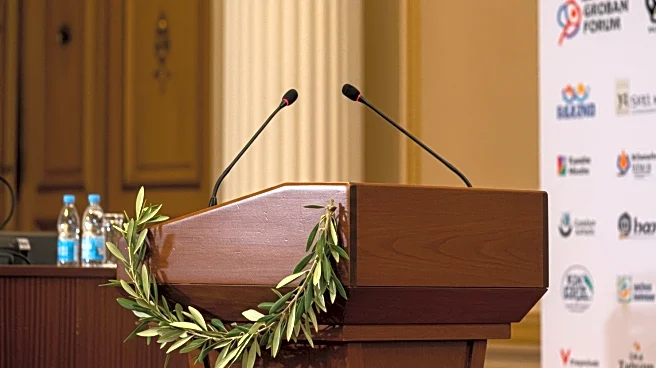What is the story about?
What's Happening?
Jordan's Foreign Minister, Ayman Safadi, recently spoke at a United Nations conference focused on the two-state solution for the Israeli-Palestinian conflict. Safadi emphasized Jordan's official support for a two-state solution but expressed concerns about unresolved issues that could threaten Jordan's vital interests. The conference aimed to explore pathways to Palestinian autonomy, with confederation being one of the options discussed. Safadi's remarks highlight Jordan's strategic interest in the stability of the region and its cautious approach to the potential outcomes of the ongoing conflict.
Why It's Important?
The discussion of Palestinian autonomy and the two-state solution is crucial for regional stability in the Middle East. Jordan, sharing borders with both Israel and Palestine, has a vested interest in the resolution of the conflict. Safadi's comments underscore the delicate balance Jordan must maintain between supporting Palestinian rights and safeguarding its own national interests. The outcome of these discussions could significantly impact diplomatic relations and security dynamics in the region, affecting not only Jordan but also neighboring countries and international stakeholders involved in Middle Eastern politics.
What's Next?
The conference at the UN marks a step in ongoing diplomatic efforts to address the Israeli-Palestinian conflict. Future discussions are likely to continue exploring confederation and other solutions for Palestinian autonomy. Jordan, along with other regional and international actors, will play a critical role in shaping the dialogue and potential agreements. The international community will be watching closely for any developments that could lead to a breakthrough in the long-standing conflict.
Beyond the Headlines
The exploration of confederation as a pathway to Palestinian autonomy raises questions about the long-term implications for governance and regional cooperation. Such a solution could redefine political boundaries and necessitate new frameworks for economic and security collaboration. Additionally, the cultural and social dimensions of confederation would require careful consideration to ensure equitable representation and integration of diverse communities.
















